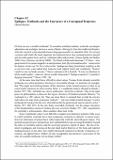Epilogue: Textbooks and the Emergence of a Conceptual Trajectory
Author(s)
Kaiser, David I.
DownloadKaiser_Epilogue Textbooks.pdf (139.4Kb)
PUBLISHER_CC
Publisher with Creative Commons License
Creative Commons Attribution
Terms of use
Metadata
Show full item recordAbstract
Of what use are scientific textbooks? To scientists and their students, textbooks can inspire admiration and nostalgia, but also a sense of limits, of being far from the intellectual frontier. After all, research in the physical sciences long ago ceased to be a bookish affair. For at least a century and a half, the most important developments have been communicated in journal articles and cognate forms such as conference talks and preprints (Frasca-Spada and Jardine 2000; Gross, Harmon, and Reidy 2002). The British scholar and statesman C. P. Snow--who spent much of his career trapped in a superposition, both physicist and novelist--observed in his famous lecture on The Two Cultures that "perhaps not many [scientists] would go as far as one hero who, when asked what books he read, replied firmly and confidently 'Books? I prefer to use my books as tools.'" Snow continued with a flourish: "It was very hard not to let the mind wander--what sort of tool would a book make? Perhaps a hammer? A primitive digging instrument?" (Snow 1959, 14)
Date issued
2013-09Department
Massachusetts Institute of Technology. Program in Science, Technology and SocietyJournal
Research and Pedagogy: A History of Quantum Physics through Its Textbooks
Publisher
Edition Open Access
Citation
Kaiser, David I. "Epilogue: Textbooks and the Emergence of a Conceptual Trajectory." Research and Pedagogy: A History of Quantum Physics through Its Textbooks. Eds. Badino, Massimiliano and Navarro, Jaume. Berlin: Edition Open Access, 2013. 285-289.
Version: Final published version
ISBN
9783844258714